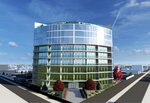

The City of Lansing welcomed the promise of a major infusion of money last month for three proposals totaling $86 million that are earmarked in Gov. Gretchen Whitmer’s $81.7 billion budget for the new fiscal year, which begins in October.
And the Schor administration and City Council are wasting no time in addressing how to deal with the windfall: At the request of Council President Carol Wood, the administration is finishing resolutions to submit to the Council next Monday (Aug.28).
What are the projects and what happens next when the Council takes up the resolutions. Will they curate a shared vision in this mayoral term that has included some rough patches between these two branches of local government?
In the end, will the results equal the dreams?
Two of these projects involve replacing and resurrecting existing landmarks.
One earmarks $40 million for “for transformational municipal infrastructure … to support the development costs of a city campus plan … ,” the budget bill approved by the Legislature says. These funds are intended by the administration to create a new City Hall.
The legislation requires the “construction of a new city administration building,” but city spokesperson Scott Bean said Tuesday that the new City Hall will not be new construction in the sense of building a new building.
Rather, he said, it will occupy space in an existing building in the downtown corridor, as the legislation requires. He said plans and the location will be unveiled “really soon” and that they will be “cool.”
Meanwhile, $6 million is designated for a “swimming pool restoration project,” meant for bringing back to life the beloved city-owned Moores Park Pool, a 101-year-old historic landmark in disrepair that the city closed in 2019.
The other $40 million outlay is for a downtown project proposed by local developer Paul Gentilozzi that is being touted as transformative — a goal the bill requires.
The budget bill appropriates the funds for a “transformational housing project … including, but not limited to a downtown corridor, central business district, or other corridor with an established improvement authority … and must support direct eligible costs of redevelopment projects that increase new affordable or workforce housing units or implement corridor improvement activities … .”
From those parameters has sprung forth “New Vision Lansing,” a $215 million plan that would provide 450 apartments, as well as retail and office space, entertainment and green-space amenities and more. Unveiled at an Aug. 8 press conference, it would be anchored by a 25-story “Tower on Grand,” a Capitol Tower mixed-use structure at Capitol Avenue and Ottawa Street, and a Washington Square building on the southwest corner of the downtown traffic circle.
“We don’t expect there to be a need for a bidding process as this project is shovel-ready,” Bean said. “Once we get this money from the state, we can begin appropriating the money quickly to these developments. In addition, the developer of the New Vision Lansing worked directly with the Legislature on that appropriation and having it flow through the City of Lansing, so we are ready to move quickly and get this new housing off the ground as soon as possible.”
“The acceptance of a grant is an up or down vote,” Wood said about what happens next. “That means that Council decides to accept the money or Council chooses not to accept the money. If we didn’t accept the money, then the Legislature has the job of taking the money and looking at the possibility of other allocations in various communities for those dollars.”
Bean said he wasn’t sure whether accepting state appropriations through a budget supplemental process constituted an up or down vote issue. “We are checking with the City Attorney’s Office now on the specific process needed to accept and appropriate the funding.”
However, Wood understands that the language in the bill specifies the type of development for these funds, but not New Vision Lansing specifically.
“The money for the housing talks about affordable or workplace housing and creating that in Lansing,” she said. “It doesn’t necessarily say the downtown area, and it doesn’t necessarily say for the developers that have come forward with an idea. But it does talk about the fact that it’s either affordable or workplace housing.”
She continued, “Then if we accept that money, most resolutions when we accept grant dollars, we accept it and appropriate it, and the administration then decides where it’s going to go. There’s some information in the bill that talks about the fact that they could do a bid process. It doesn’t say they have to; it says you could.”
Wood said that the resolutions would likely be turned over to the Committee of the Whole — rather than to the Ways and Means Committee as is typically done with grants — so all of the Council members could study it together.
“So, what Council will be looking at is ‘why this developer?’ ‘Why no bid process?’ as we look at that money and accepting that grant,” she added.
Regarding City Hall, Bean said the administration has plans to announce a new location soon and that it supports an updated plan from Chicago-based developer J. Paul Beitler for turning the current City Hall into a hotel. When the city asked for requests for proposals in 2021 for a new city hall and what to do with the old one, only Beitler responded to the latter. It was essentially Beitler’s confirmation that he remained interested in implementing the proposal that previous Mayor Virg Bernero endorsed when Beitler pitched it in 2017.
Bean said the city’s development officer has been working with Beitler to get everything updated.
The Moores Park Pool project is the furthest along of the three, thanks to a $150,000 study paid for by public and private funds. It “will go through our Parks & Recreation Department to be put out for work, likely through an RFP process,” Bean said.
“The community has been behind this for some time,” Wood added. “I think the one question that we would be trying to follow up on is to make sure if there’s a plan in place once renovations are done that they’re going to keep the pool up.”
Overall, Wood said about the funding, the Council needs to know “the timeline about accepting and the timeline about spending and whether those can be met with the people that are putting forth projects at this time.”
But as she and the Council examine the proposals in committee, there’s a common train of thought that they share with the Mayor’s Office.
“The one thing extremely important is right now we have people in the Legislature and the Governor’s Office that are willing to put some dollars back into Lansing when it’s not been something that’s been done in the past.
“If we say no to them, are they going to come back next year?”
Support City Pulse - Donate Today!
Comments
No comments on this item Please log in to comment by clicking here